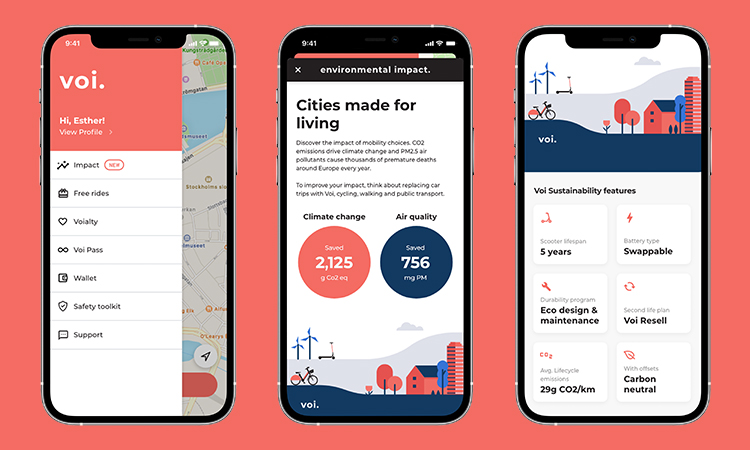Voi introduces environmental impact app dashboard for riders to better understand journey emissions
- Like
- Digg
- Del
- Tumblr
- VKontakte
- Buffer
- Love This
- Odnoklassniki
- Meneame
- Blogger
- Amazon
- Yahoo Mail
- Gmail
- AOL
- Newsvine
- HackerNews
- Evernote
- MySpace
- Mail.ru
- Viadeo
- Line
- Comments
- Yummly
- SMS
- Viber
- Telegram
- Subscribe
- Skype
- Facebook Messenger
- Kakao
- LiveJournal
- Yammer
- Edgar
- Fintel
- Mix
- Instapaper
- Copy Link
Posted: 1 November 2021 | Intelligent Transport | No comments yet
Voi’s new Impact Dashboard will display the estimated emissions that riders have avoided through opting for carbon neutral e-scooters or e-bikes in an effort to raise awareness about the environmental impact of different mobility choices.


Credit: Voi Technology
Voi Technology – the European micro-mobility operator – has announced the launch of an environmental ‘Impact Dashboard’ in the Voi app to inform riders about the CO2 emissions and air quality impact of their journeys. The dashboard is designed to raise awareness about the environmental impact of different mobility choices and to allow riders to make more sustainable and informed transport choices.
The Impact Dashboard will display the estimated carbon dioxide (CO2) emissions that riders have avoided through opting for carbon neutral e-scooters or e-bikes for their accumulated journeys. This data will take into account the emissions produced across the full life cycle of vehicles, from production to end-of-life recycling.
According to Voi’s Life Cycle Assessment (LCA) conducted by EY, the average Voi scooter ride emits 29g CO2 equivalent per passenger-km of life cycle emissions, compared with 184 g per passenger-km emitted by a passenger car. Voi’s current life cycle emissions have been reduced drastically over the past three years, notably thanks to extending vehicle lifespan from several months to five years and scaling its net-zero operations.
In addition, the dashboard will display the rider’s average impact on air quality in grams of PM2.5 avoided. PM2.5 is the term for particulate matter with a diameter of fewer than 2.5 microns that results from partially combusted fuel. Exposure to PM2.5 caused over 400,000 deaths in Europe alone in 2018, and it is ranked as the fifth greatest risk factor for global mortality.
The environmental calculator on which the dashboard is built was verified by transport modellers at University College London’s MaaS Lab. It uses a combination of data, including: each user’s ride data; car replacement rates collected from Voi rider research; official emission factors for other transport modes; Voi’s CO2 and PM2.5 equivalents emission factors based on an LCA, which analysed the cradle-to-grave environmental impact of Voi’s service; and Voi’s portfolio of verified carbon offsetting projects.
Over time, the Impact Dashboard will develop to showcase the user’s own impact on the environment by opting for sustainable micro-mobility. This will not only allow people to further explore the carbon reduction potential of their mobility choices, but also provide them with additional information on how mobility habits impact public health.
Encouraging sustainable transport choices
Since launching in Europe in 2018, over 70 million trips have been taken on Voi’s bright coral e-scooters and e-bikes across 70+ cities in 11 countries. According to Voi global data, on average 15.4 per cent of rides replace cars, taxis and ride-hailing, and over 47 per cent of users combine e-scooters with public transport.
Voi is committed to improving the sustainability of its services as part of its Climate Action Plan. The latest e-scooter model, the Voiager 4, has an expected lifespan of over five years. It is equipped with swappable batteries that are changed on the spot to avoid trips to warehouses and support greener operations. Over 90 per cent of the Voiager 4 is recyclable, and Voi is working towards having 95 per cent recycled material content in scooters at the production stage by 2025. The company also has a zero-waste policy and ensures that it repairs, reuses and gives vehicles and batteries a second life as long as they meet safety requirements.
Fredrik Hjelm, CEO and Co-Founder of Voi Technology, said: “A year into the ‘Decade of Action’, the global community urgently needs to step up ambition for the best chance of tackling the climate crisis, delivering on the Paris Agreement and transitioning to net-zero transport. To date, Voi riders have replaced 11 million car rides and saved over 3,000 tonnes of carbon emissions and nearly 1,750kg of PM2.5 particles from entering the atmosphere by opting for shared micro-mobility since 2020. However, there’s still so much more that needs to be done. While heads of state, delegates and civil society gather in Glasgow for COP26, we want to do our part by giving people the tools to make informed mobility choices so that they can have an active role in the transition to sustainable transport. Together, with cities, citizens and other public transport and micro-mobility operators, reducing the need for short car trips, reduce harmful emissions and re-shape our cities so they are made for living.”
Voi’s aim is to help to create cities that are made for living, free from congestion, noise and pollution, which is in line with the UN Sustainable Development Goal 3 – Good Health and Wellbeing. Central to this mission is its support for the 15-minute city concept, created by Professor Carlos Moreno. By ensuring that all communities’ needs are accessible within a 15-minute walk, scooter or bike ride, the 15-minute city model can help transform cities from stressful, polluted places into vibrant places to live and work.
The Impact Dashboard will be rolling out in all Voi markets from 1 November 2021. In order to access it, Voi riders need to ensure that they are using the most up to date version of the Voi app, available from the Apple App Store and Google Play Store.
Related topics
Air Quality, Alternative Power, On-Demand Transport, Passenger Experience, Sustainable Urban Transport, Travel & Passenger Information
Related modes
Bikes & Scooters
Related organisations
University College London, Voi Technology
Related people
Fredrik Hjelm







